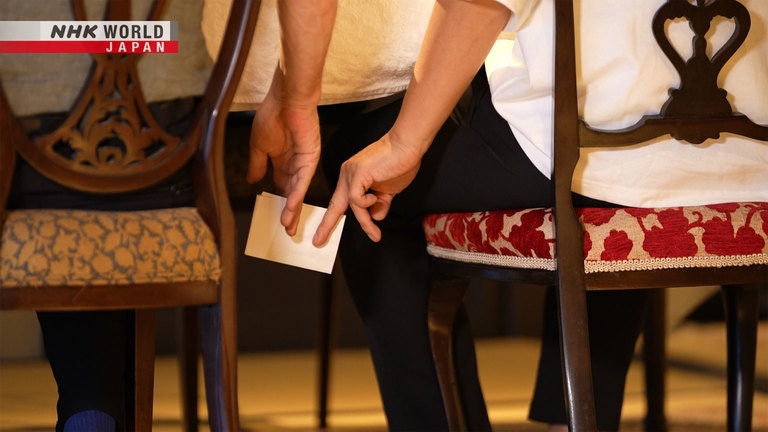Root
The Japanese language is rich in words and expressions influenced by nature, history and culture. This episode focuses on words related to ne, or "root." Japan's agricultural history has inspired many unique expressions associated with roots. Today, many of them have also taken root in the business world. From his home in Kyoto Prefecture, poet and literary translator Peter MacMillan guides us through these words and the culture behind them.



Transcript
"Yukigesho."
"Karakurenai."
The Japanese language is rich in unique expressions that reflect nature and culture.
Magical Japanese.
Today's theme is "ne," or "root."
Hello! I'm Peter MacMillan.
So, what do you think of my vegetables?
I think they're coming along quite nicely.
These are root vegetables, and today's theme is 'roots.'
As an agricultural people, the Japanese have come up with many expressions related to 'roots.'
"ne o orosu."
"Orosu" means "to lower."
The phrase "ne o orosu" comes from the way plants extend their roots deep into the ground, and firmly capture the soil.
It's used when something new takes root in society, or when someone settles down somewhere to live.
"ne o orosu."
"nezuyoi."
"Zuyoi" comes from "tsuyoi," meaning "strong" or "firm."
The phrase likens things to plants, that have their roots deep in the soil.
Such plants are stable and resilient.
The restaurant has been loved for
three generations, and has "nezuyoi," enduring, popularity.
"nezuyoi."
Meanwhile, here's a word for something that's not firmly rooted:
"nenashigusa no yo na."
"Nashi" means "without," and "gusa" means "grass."
The phrase literally means "like a rootless plant," and refers to water plants that seem to float without roots.
It describes a person who drifts between different places, jobs, or ideas - or to this type of lifestyle.
"nenashigusa no yo na."
Roots are not exclusive to plants.
There are also 'roots' in the human body.
"shita no ne mo kawakanu uchi ni."
"Shita" means "tongue."
"Shita no ne" is the root, or base, of the tongue.
"Kawakanu uchi ni" means "before it dries."
The phrase is used disapprovingly, when someone contradicts something they just said.
He vowed to keep early hours,
but "shita no ne mo kawakanu uchi ni," no sooner had he said it, he's still staying up late.
"shita no ne mo kawakanu uchi ni."
Some words with "ne" are used to describe a person's character.
"kokorone ga ii."
"Kokoro" is "heart."
"Kokorone" refers to a person's true feelings or character.
"Ii" means "good."
He looks hard to approach at first, but is in fact "kokorone ga ii," kindhearted.
"kokorone ga ii."
Root-related expressions have also taken root in the business world.
Let's say you're determined to get your idea approved at an upcoming meeting.
This expression is just for you:
"nemawashi."
"Mawashi" means to make arrangements.
"Nemawashi" refers to making behind-the-scenes arrangements,
before an important occasion - like a meeting or a contract signing - to achieve a desired outcome.
The phrase is inspired by how a plant's roots extend discreetly underground.
I did some "nemawashi," behind-the-scenes work, so that the plan would get the green light.
"nemawashi."
If you're in charge of a large project at work, the following might be important:
"kakine o koeru."
A "kakine" is a hedge, fence, or other dividing structure rooted in the ground around a house or a piece of land.
"Koeru" means "to go over."
The phrase "kakine o koeru" means to overcome existing borders.
This is one of the biggest projects in the history of our company.
Let's make sure our different departments
"kakine o koeru," cross team lines, and cooperate.
"kakine o koeru."
This phrase is handy when something isn't rooted in fact.
"ne mo ha mo nai."
"Ha" is "leaf."
The entire phrase literally means "doesn't have roots or leaves."
Just as such a plant can't actually exist, the phrase is used to describe something that is completely groundless and false.
You need to be careful because there are
"ne mo ha mo nai," completely groundless, stories on the internet.
"ne mo ha mo nai."
Some words related to 'root' come from Buddhist teachings, and reflect the long history of Buddhist worship in Japan.
"konjo."
"Kon" is another reading for "ne."
"Konjo" originally meant the qualities or abilities necessary to accept the teachings of Buddha.
Today, it is often used to refer to the strength of character, that allows a person to defeat obstacles and succeed.
A similar word in English might be "guts" or "grit."
Peter studies Japanese culture until late every night after work.
He has "konjo," grit.
"konjo."
And when you exercise "konjo"...
"kon o tsumeru."
"Tsumeru" is associated with making continuous efforts.
"Kon o tsumeru" describes a state of intense focus, where you even forget to rest.
She always "kon o tsumeru," goes all in, before a presentation.
"kon o tsumeru."
Oh, whoops! Excuse me...
I just had a craving for a snack...
I was eating this vegetable called "gobo," or "burdock root."
In the past, people from abroad were shocked when they thought that Japanese people were eating tree roots.
Actually, it was this gobo.
Gobo is a common ingredient in Japanese cuisine.
It is eaten both on festive occasions, and as part of an everyday diet.
Here's a unique word using gobo:
"gobo nuki."
"Nuki" means "to pull out."
"Gobo nuki" means rapidly overtaking many competitors in a single try.
It's likened to how a long, narrow gobo root is usually pulled from the soil in one go.
After the anchor received the baton,
he instantly led the team to victory by "gobo nuki,"
overtaking his rivals in a single burst.
"gobo nuki."
What did you think of the program?
I hope that watching this program will help you improve your Japanese, so that you can "gobo nuki" those around you.
See you next time.
Bye!